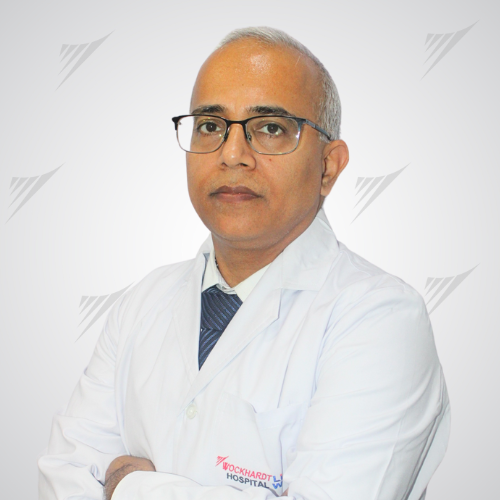Home » Speciality » Vascular Surgery
Vascular Surgery
Procedure & Treatment

Why Choose Wockhardt Hospitals For Vascular Surgery?
Vascular surgery is a surgical specialty at Wockhardt Hospitals, dealing with blood vessel problems such as arteries, veins, and lymphatics. Every medical professional at Wockhardt is well-trained, highly experienced, and backed with a wide range of new-age medical technology; we have taken a new approach toward the treatment of vascular disease. The most prevalent condition which is treated by performing Vascular surgery is varicose veins.
Wockhardt Hospitals work on the philosophy of “life wins,” always opting for a patient-centric approach to provide the utmost quality of care and treatment. Also, we have two highly advanced cath labs with ultra-modern technologies to perform precise treatment procedures for cardiovascular and other conditions of vascular disease. The OTs (Operation Theatres) at the Wockhardt Hospitals are modulated and integrated with high-quality machines that match international standards and produce desired medical outcomes.
Renowned Vascular Surgeons/
Doctors at Wockhardt
Hospitals
- Mumbai Central
- Mira Road
- Nagpur
- Rajkot
What is Vascular Surgery?
Vascular surgery is a term used for a wide range of surgeries (open and minimally-invasive), which involves removing the blockage of blood vessels. Blood vessels are a network of veins, artilleries, and capillaries that helps carry the blood to and from your heart to other parts of the organs and tissue. Sometimes, there are complications in the blood vessels that might lead to a heart attack. This is why vascular surgery is required. There are several types of vascular surgeries done depending on the types of blockage.
To carry on vascular surgery procedures, vascular surgeons order diagnostic tests. Sometimes doctors might prescribe medications to treat the condition. However, sometimes surgery is required to keep the condition from getting worse and making it better. Vascular surgery treatment involves the following –
- Repairs damaged blood vessels that cause vascular diseases.
- Reduce the risk of further complications.
- Make access to your blood vessels possible for medical treatments such as dialysis.
What are the Signs and Symptoms of Vascular Disease
(Indications that you require Vascular Surgery)
The signs and symptoms of vascular diseases are as below that require treatment –
Peripheral Vascular Disease
- Pain in your toes, arms, hands, feet, etc.
- Skin discoloration
- Skin ulcers
- Uncontrolled hypertension and abnormal kidney function
- Red or blue fingers and toes.
Carotid Artery Issue
- Mini stroke.
- Headache, neck pain, eye or facial pain
- High blood pressure or hypertension, sweating, and palpitation
Venous Disease
- Pain or heaviness in your arm and legs
- Swelling, cramps, and tenderness in your leg
- Redness or skin discoloration
- Tingling and numbness in your arm, legs, and hands
Blood Clots
- Pulmonary embolism
- Pain, swelling, heaviness, and warmth in the leg and hands
- Red skin
- Blue colored skin
- Inflammation, pain, and warmth around your vein
Aortic Aneurysm Symptoms
- Chest pain
- Fast heart rate
- Swollen neck
- Trouble swallowing
Fibromuscular Dysplasia (FMD)
- Dizziness
- Hypertension
- Neck pain
- Hearing your heartbeat in your ear
Lymphedema
- Swelling in your arms and legs
Vasculitis
- Fever
- Swelling
Colorectal conditions might often lead to bleeding in the digestive tract. The blood can occasionally be detected in the stool or make it appear darker. However, the stool frequently appears normal. Blood loss can accumulate over time and result in anemia, commonly known as low red blood cell count. A blood test revealing a low red blood cell count might occasionally be the first indication of a colorectal condition. Some people might also experience jaundice or troubled breathing.
Many of these symptoms can be caused by conditions other than colorectal conditions, such as infection, hemorrhoids, or irritable bowel syndrome. So, if you have any of these conditions, it is better to see the expert doctors at Wockhardt Hospitals. They will help you precisely diagnose and treat the problem.
What are the Causes
of Vascular Disease?
The exact causes of vascular diseases are not yet known. However, some of the factors that might lead to vascular disease are as follows –

- Diabetes
- Atherosclerosis, also known as plaque buildup
- Blockage caused by blood vessels by a mass of debris or blood clot
- High cholesterol
- High blood pressure
- Certain Medicines
- Family history
- Infection
- Blood clots
- Cold temperatures
- Blood vessels inflammation
- Emotional stress
- Injury
- Being overweight
- Lack of physical activities
- Smoking or using tobacco products
Treatments for
Vascular Diseases
The treatment of vascular diseases depends on the type of condition you are having. For some mild conditions, medication can work wonders, while for severe conditions, you must undergo open or minimally invasive vascular surgery (as decided by the doctor). Below are a few vascular diseases and their treatments –
Peripheral Artery Disease
Peripheral artery disease is also known as peripheral vascular disease. It is a condition where the blood flow reduces to the arms or legs due to narrowed arteries. It is usually a sign of a deposit of fats in the arteries (atherosclerosis), and its course of treatment might include-
- Angioplasty
- Maintaining proper diet
- Surgery to release Popliteal Artery
- Medicines to open blood vessels
- Stenting or Bypass Surgery
Carotid Artery Disease
Carotid artery disease occurs when fatty deposits, also known as plaque, clog the blood vessels that deliver blood to the brain and head. This increases the risk of stroke and needs to be treated at the earliest with the following approaches.
- Medicines to lower cholesterol
- Carotid Endarterectomy
- Angioplasty
- Antiplatelets
- Anticoagulants
- Stenting
- Clot-busting medicines
- Antihypertensives drugs
- Cholesterol-lowering medicines
- Stent Graft medicines
Venous Disease
Any disease that affects the veins in your body is known as venous disease. In venous disease, the valves are damaged, which causes the blood to flow backward, or in both directions. The doctor can go for the combination of the following treatment approaches.
- Laser therapy
- Physical therapy
- Medicine
- Surgery
- Blood thinners
- Support stockings
- Anticoagulants
Blood Clot
A blood clot happens when your blood solidifies (semi-solid). Usually, the blood clots prevent further blood loss. However, if the blood clots occur due to certain medical conditions, they might be life-threatening.
- Anticoagulants
- Blood thinners
- Support stockings
- Surgery
- Thrombolytic therapy
- Clot removal
Aortic Aneurysm
An aortic aneurysm is a bulge that occurs in the wall of the aorta, which carries blood from the heart to the body, which increases the risk of a tear in the inner layer of the wall. This usually requires vascular surgery (which can be major) for its treatment.
Fibromuscular Dysplasia
Fibromuscular dysplasia causes the enlargement and narrowing of the medium-sized arteries in the body, and its treatment methods include-
- Blood thinners
- Medicine for pain
- Angioplasty
- Vascular surgery to prevent ruptures
Lymphedema
Lymphedema refers to tissue swelling caused by the accumulation of protein-rich fluid and usually affects the arms and legs.
- Light physical therapy
- Wear compression sleeves
- Move the affected limb for further movement
- Vascular Surgery
Vascular Surgery Procedure
Vascular surgery is done depending on the medical condition the patient is experiencing. Before your surgical operation, your surgeon will inform you what to expect. Depending on the type of surgery required, preparation might begin days or weeks in advance and normally includes a physical evaluation and testing.
Before Surgery
Before the surgery, the doctor would advise you to undergo several tests such as –
- Angiogram
- CT Angiogram
- Doppler Ultrasound
- Echocardiogram
- Electrocardiogram
- Ankle-Brachial Index
- Magnetic Resonance Angiogram (MRA)
In addition to this, the doctor will inquire about your medical history and if you are taking any medication currently. They will give you instructions regarding certain do’s and don’ts before the surgery and advise when you need to stop eating or drinking before the surgery.
During Surgery
What happens during the surgery depends on the type of vascular condition. Also, it is important to know whether the surgery will be open or minimally invasive. In open surgery, the doctor will make long incisions to access the affected veins, but in minimally invasive surgery, the surgeon makes smaller incisions. They put a catheter (a thin tube) through an aperture and direct it to the area that needs treatment. After the surgery, the incisions are sutured properly.
After Surgery
You will be kept at the hospital for further analysis. Depending on the surgery you had, you will be kept in the ICU (Intensive Care Unit) to check your vitals and response. However, if you had a minimally invasive surgery, you are allowed to go home the next day. But you must take good care of your surgery to ensure a smooth recovery. Doctors will advise you what you must or must not do. Also, keep your doctors informed, as surgeries tend to show some complications in some cases.
Who Gets
Vascular Surgery Treatment?
Anyone suffering from vascular diseases such as peripheral artery disease, carotid artery disease, vasculitis, lymphedema, etc., requires vascular surgery. In case of a serious medical complication, the doctor would advise to undergo a vascular surgical operation. Usually, people suffering from the following conditions require vascular surgery –
- Plaque Deposits
Plaque deposits cause blockage in the coronary artery. Two types of surgeries are done for removing plaque deposits – Coronary Angioplasty & Stent Placement and CABG (Coronary Artery Bypass Graft Surgery).
- Deep Vein Thrombosis
To treat Deep Vein Thrombosis, the doctors perform Thrombectomy, where they cut through a vein above the clot to remove it.
- Aortic Aneurysm
The most commonly used surgical procedure for aortic aneurysm is open chest vascular surgery. In this surgery, the weak section of the aorta is replaced with a tube or graft.
- Chronic Venous Insufficiency
To treat chronic venous insufficiency, the surgery used is called ligation. In this surgery, the affected vein is tied off so that the blood does not flow any longer through it.
Vascular surgery becomes a viable option for patients whose condition is getting worse without any improvements from other treatment methods.
FAQs on Vascular Surgery
Q. What are the signs of vascular disease?
Vascular disease symptoms include claudication, which is discomfort or cramping in the legs during physical exercise; numbness or weakness in the legs; coldness or discolouration of the extremities; delayed wound healing; changes in the texture or colour of the skin; and, in males, erectile dysfunction.
Q. Who is at high risk for vascular disease?
Vascular disease is more likely to occur in those with specific risk factors, such as diabetes, smoking, high blood pressure, high cholesterol, obesity, family history of the condition, and a sedentary lifestyle. Furthermore, because of the normal deterioration of blood vessels with age, there is a higher chance of vascular problems.
Q.How serious is vascular surgery?
Q. Is vascular surgery a major surgery?
Q. Can you live a normal life with vascular disease?
Q.Can vascular problems be cured?
Vascular problems are not curable. Instead, it can be managed, and the symptoms can be lowered using surgical procedures or following a healthy living lifestyle. Your doctors might prescribe medications and other preventive measures to manage your weight, cholesterol, blood clots, and any other conditions or causes of vascular problems.






















